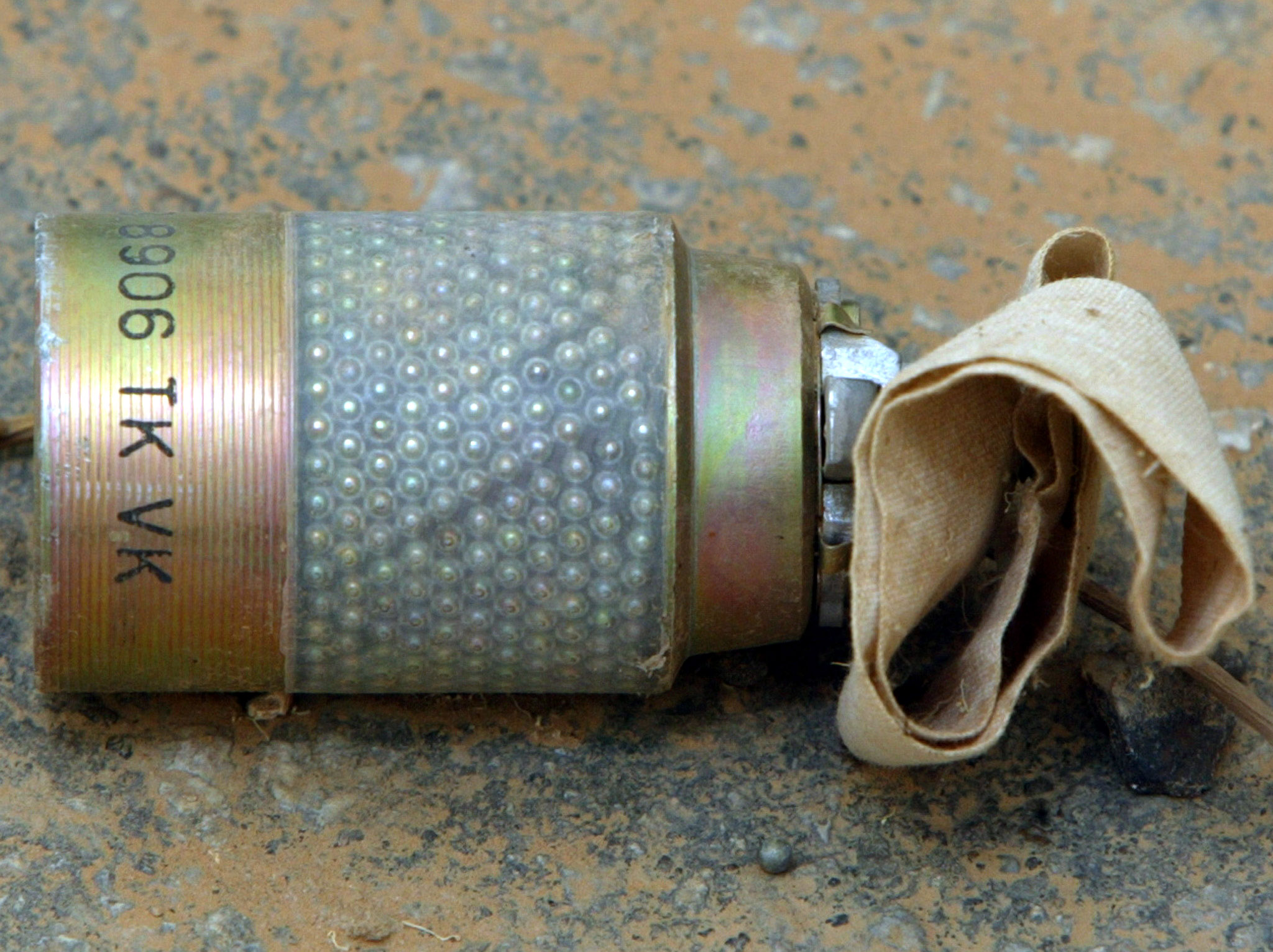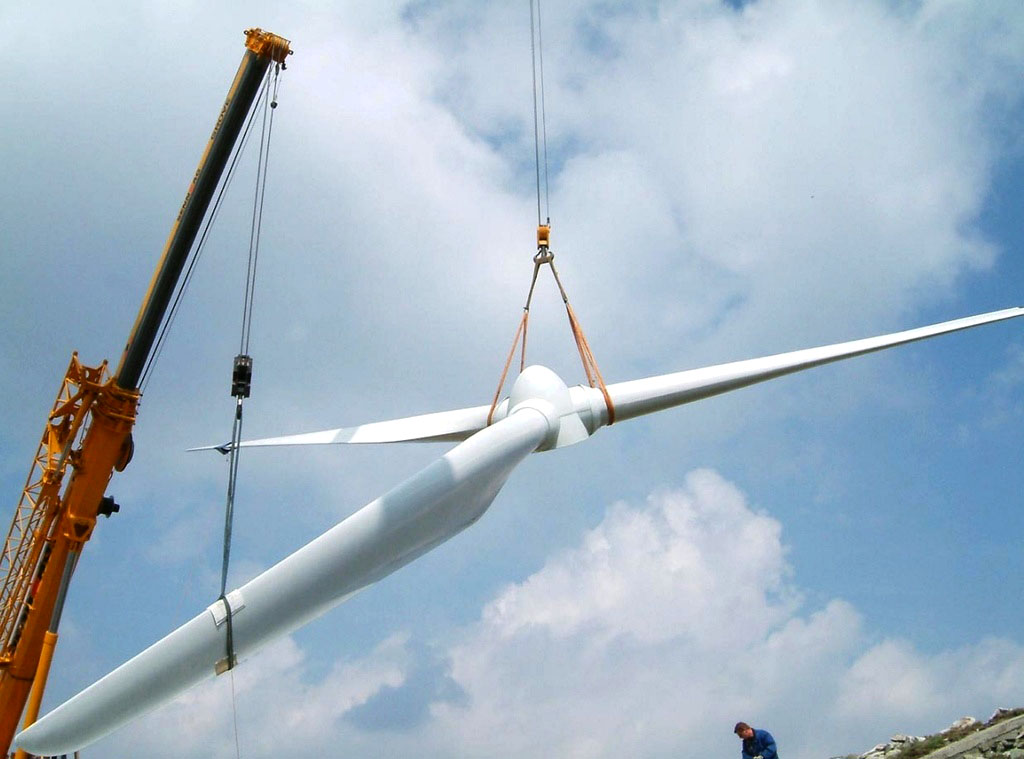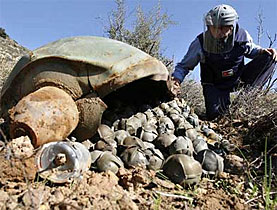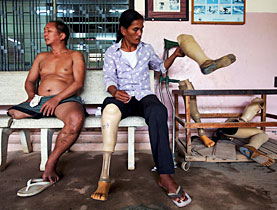Banks targeted over cluster bomb investments

Swiss banks UBS, Credit Suisse and Vontobel are among 146 financial institutions that have invested billions of dollars in cluster bomb producers, campaigners say.
The investments occur despite the entry into force of the international treaty banning cluster munitions on August 1, groups claim. Switzerland, which formally signed the text in 2008, is expected to ratify it in 2011.
“It’s unacceptable that our pension funds or the savings of the Swiss people are invested in producing weapons that kill and mutilate children around the world,” Paul Vermeulen, director of Handicap International Switzerland, told reporters in Geneva on Wednesday.
Cluster munitions are large weapons deployed from the air or launched from the ground that release hundreds of smaller submunitions but are imprecise and unreliable, killing and injuring even after conflicts are over.
According to the “Worldwide investments in cluster munitions: a shared responsibility” report by the Cluster Munitions Coalition, financial institutions from 15 countries have provided over $43 billion (SFr45.2 billion) worth of investments and financial services since May 2007 to seven cluster bomb producers.
These include United States firms Alliant Techsystems, L-3 Communications, Lockheed Martin and Textron, South Korean firms Poongsan and Hanwha, and Singapore Technologies Engineering (STE).
The report said the worst culprits were US banks (over half), while 102 were from countries that had not signed the cluster bombs treaty. Top lenders included Bank of America ($436 million), Citigroup ($321 million) and Goldman Sachs ($250 million).
Vermeulen said the three Swiss banks had invested SFr500 million in several of the firms mentioned in the report. But 25 other Swiss financial institutions hold shares or bonds in a number of the seven manufacturers, he added.
“This is about banning investments that make profits from human suffering,” said Vermeulen.
Responsible behaviour?
UBS said it was moving away from such unethical investments.
“For its actively managed Luxembourg and Swiss-domiciled retail and institutional funds, UBS Global Asset Management is implementing a process to prevent investments in companies involved in anti-personnel mines and cluster munitions,” UBS spokesperson Dominique Scheiwiller told swissinfo.ch.
The bank stressed it was committed to “responsible corporate behaviour”. It has identified guidelines covering industry sectors that have a high potential for environmental and social risk.
It also has clear internal regulations prohibiting the financing of trade and export of certain war materials, including anti-personnel land mines and cluster munitions, it said.
“The report shows [the bank] does not play a major role in providing services for companies which, among others, manufacture the ammunition in question,” said Credit Suisse spokesman Alex Biscaro.
Vontobel admitted investing in STE and L-3 Communications in the past but claimed it had stopped doing so since the end of 2009.
“A qualitative ethical assessment is made regarding human rights violations and companies that are materially involved in certain negative activities will be excluded from being held in our portfolios,” said spokesman Reto Giudicetti.
Experts say while it may be hard to determine exactly where investments in large transnational civil-military firms end up, it can be equally difficult for banks to refuse portfolios that include some of the big US industrial firms, especially when the banks have a global reach beyond national borders.
Swiss legislation
An international convention on cluster munitions is due to enter into force on August 1 after 30 countries ratified the ban agreed in Oslo, Norway in 2008.
Vermeulen said Switzerland should respect the spirit of the Oslo text and remain inflexible when it came to forbidding investment into weapons banned under Swiss law.
The issue is due to be discussed in the coming months as part of the revision of the law on war materials.
Two parliamentary motions, proposed by Social Democrat parliamentarian Liliane Maury Pasquier and centre-right Radical Hugues Hiltpold, which call for a ban on financing cluster munitions, were recently accepted by the government.
The definition of direct and indirect investments and the share of a firm’s activities in the military sector remain contested, however.
Campaigners hope Switzerland will soon join countries like Belgium, Ireland, Lebanon, Luxembourg, Mexico, New Zealand, Norway and Rwanda in passing legislation prohibiting investments in the deadly munitions.
“It’s essential for the Swiss government to point out to Swiss financial institutions the limits of what is authorized and what is not,” said Vermeulen.
Simon Bradley, swissinfo.ch
Cluster munitions are large weapons deployed from the air or launched from the ground that release dozens or hundreds of smaller submunitions.
Some 34 countries are known to have produced over 210 different types of cluster munitions. These include projectiles, bombs, rockets, missiles and dispensers.
At least 75 countries currently stockpile millions cluster munitions containing billions of individual sub-munitions.
A 2007 study published by Handicap International confirmed 13,306 deaths and injuries due to cluster munitions.
In Lebanon, up to 4 million sub-munitions were delivered in 5 weeks in 2006. Hundreds of thousands did not explode on impact.
During the Kosovo conflict, up to 290,000 sub-munitions were delivered in 11 weeks. Approximately 30,000 failed to explode.
Some 270 million sub-munitions were released over Laos from 1964 to 1973. An estimated 9-27 million did not explode.
(Source: International Committee of the Red Cross)
The Convention on Cluster Munitions (CCM) was adopted on May 30, 2008 by 107 states at a conference in Dublin, Ireland.
The CCM prohibits the use, development, production, acquisition, stockpiling, retention and transfer of cluster munitions. It also prohibits assisting, encouraging or inducing anyone to engage in these activities. Once a state has become a party to the treaty, it cannot defer this ban.
Under the CCM, states commit to clearing areas contaminated with unexploded submunitions within ten years of the instrument’s entry into force for that state. They also agree to destroy their cluster munition stockpiles within eight years.
In addition, state parties with cluster munition victims on their territory or under their control must provide medical care, rehabilitation and psychological support, and provide for their social and economic inclusion on a non-discriminatory basis.
The CCM has so far been signed by 105 states and ratified by 30. It will enter into force on August 1, 2010.
After signing the treaty on December 3, 2008, Switzerland is undergoing a political consultation process with a view to possible ratification at the end of 2011 at the earliest.

In compliance with the JTI standards
More: SWI swissinfo.ch certified by the Journalism Trust Initiative




You can find an overview of ongoing debates with our journalists here. Please join us!
If you want to start a conversation about a topic raised in this article or want to report factual errors, email us at english@swissinfo.ch.